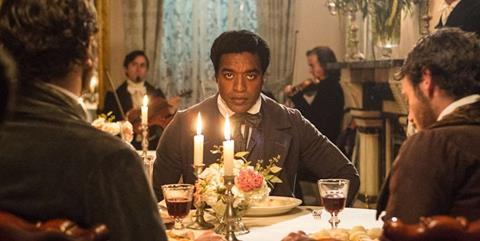Dir: Steve McQueen. US. 2013. 134mins

An engrossing, unsentimental odyssey, 12 Years A Slave finds director Steve McQueen moving away from the intimate, razor-sharp approach of his first two films, Hunger and Shame, for a broader canvas and a more sweeping narrative. Some of the distinctive power of his previous work gets lost in the process, but by any metric this unflinching look at the corrosive evil of American slavery gets under the skin with consistent force.
Unlike the average “message movie,” 12 Years A Slave wants to do more than condemn this social ill but, rather, investigate how it operated in its time as well as consider the moral repercussions of its existence.
Earning raves at Telluride and Toronto, this Fox Searchlight release seems primed for a major awards push, starting with its arrival in US theatres on October 18. The moral seriousness of the content matched by the quality of the performances will make this a strong Oscar contender, and while star Chiwetel Ejiofor isn’t a household name, glowing reviews should attract plenty of art-house patrons, with mainstream crossover definitely a possibility.
Based on the memoir of Solomon Northup, a free black man living in New York in the 1800s, 12 Years A Slave chronicles the more than a decade that Northup (Ejiofor) was a slave in the American South, where the practice was still legal. A successful musician and family man, Northrup accepted a job offer in 1841 to play with a traveling circus, which turned out to be a ruse so that shady businessmen could sell him into slavery. Despite his protestations, Northup is stripped of his freedom, his identity and even his name, being called Platt as he works for white plantation owners in Louisiana.
In his previous films, McQueen has focused on the spiritual (and sometimes physical) turmoil of his tortured characters. With 12 Years A Slave, McQueen returns to this territory, exploring how an educated, sweet-natured individual must degrade himself in order to stay alive. (Early on, another slave advises Northup that whites who discover he can read and write may want to kill him, not wanting intelligent slaves around who might be less compliant.)
Working from a screenplay by John Ridley, McQueen has crafted his film as something of a prison drama, showing how Northup tries to maintain his self-worth in unforgiving conditions. But unlike some entries in that genre, 12 Years A Slave eschews an inspirational tone and avoids making Northup a symbol of the human spirit or a man whose imprisonment is meant to be a spark for profound character growth.
In truth, Northup’s inner life is kept somewhat opaque, the depth of his anger and sorrow largely hidden from view. As Ejiofor plays him, Northup is a proud man who quickly accepts that he must shield his schooling from his bosses, adopting the persona of a simpleminded slave in order to avoid suspicion. This is a performance with only a few showy moments, Ejiofor and McQueen instead letting the drama simmer at a lower temperature so that the duration of Northup’s enslavement can feel more oppressive and never-ending.
With its first-rate production design and costumes, 12 Years A Slave is visually rich, but McQueen and his long-time cinematographer Sean Bobbitt have done a commendable job turning the beautiful Louisiana locations into both an Eden and a hell. The wide open skies and lush woods give the plantation scenes a sense of an untouched paradise, a cruel counterpoint to the horrors that Northup observes in his 12 years.
McQueen treats slavery as a ghastly inhumanity, but his approach is less overt than is typical. Unlike the average “message movie,” 12 Years A Slave wants to do more than condemn this social ill but, rather, investigate how it operated in its time as well as consider the moral repercussions of its existence. Utilising several superb single-take scenes — a speciality of McQueen and Bobbitt’s collaborations — the movie puts the audience into this world with a matter-of-fact approach, illustrating the structure and rules within slavery. The calm, unblinking treatment, which makes plain the era’s rampant brutality, adds to the power by not overselling the drama.
With that said, the movie’s somewhat meandering tone and familiar arc hamper the narrative a bit. In a sense, the repetition of cruelty — and the unlikely journey of Northup from a kinder owner (Benedict Cumberbatch) to a more malicious one (Michael Fassbender) — helps to drive home the point that Northup’s misery seemed interminable and inexplicable. But the broader approach to storytelling on McQueen’s part robs 12 Years A Slave of some of the precise, up-close vibrancy that was the hallmark of his earlier films. As a consequence, this new film feels a little less personal, although that criticism should not dismiss the intelligence and feeling on display.
Alongside Ejiofor, 12 Years A Slave also boasts fine turns from Fassbender (as a hateful, weak-willed racist) and Alfre Woodard (as a former slave turned wife of a slave owner). But special kudos go to Sarah Paulson, who plays Fassbender’s vindictive wife, her contempt for blacks and her philandering husband combining to twist her face into a mask of anger. Also excellent is Lupita Nyong’o as a younger slave who represents to Northup a flickering beacon of hope in the middle of such human agony.
Production companies: Regency Enterprises, River Road Entertainment, Plan B, New Regency, Film4
US distribution: Fox Searchlight Pictures, www.foxsearchlight.com
International sales: Summit Entertainment, www.lionsgate.com
Producers: Brad Pitt, Dede Gardner, Jeremy Kleiner, Bill Pohlad, Steve McQueen, Arnon Milchan, Anthony Katagas
Executive producers: Tessa Ross, John Ridley
Screenplay: John Ridley
Cinematography: Sean Bobbitt
Editor: Joe Walker
Production designer: Adam Stockhausen
Music: Hans Zimmer
Website: www.foxsearchlight.com/12yearsaslave
Main cast: Chiwetel Ejiofor, Michael Fassbender, Benedict Cumberbatch, Paul Dano, Garret Dillahunt, Paul Giamatti, Scoot McNairy, Lupita Nyong’o, Adepero Oduye, Sarah Paulson, Brad Pitt, Michael Kenneth Williams, Alfre Woodard, Chris Chalk, Taran Killam, Bill Camp





















